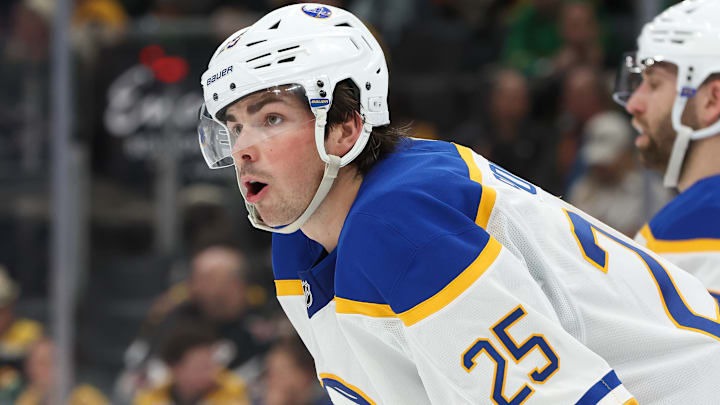Buffalo Sabres fans hoping to witness a light at the end of the tunnel for the franchise's endless rebuilding cycle should avoid the latest forecast in the Daily Faceoff NHL in 2030 series, which predicts where each NHL team will rank five years in the future.
Paul Pidutti, who's well-known for this Hockey Hall of Fame forecasts and era-adjusted statistics, placed the Sabres at No. 22 based on the organization's leadership, current group of core players (Rasmus Dahlin, Tage Thompson and Owen Power), prospects and a variety of other factors.
"I want to believe in Buffalo, I really do," Pidutti wrote. "Finishing between last place and 18th in the standings for 14 consecutive years makes that difficult. The Sabres' talented trio of Dahlin, Thompson, and Power is controlled through 2030. That's encouraging. But the list of challenges is long: attracting free agents; ownership without vision; a revolving door of management and coaches; player development issues."
Sadly, it's hard to argue against that assessment.
Pidutti added: "A single playoff spot between 2026 and 2030 feels like it would be a win right now."
The Sabres are riding a 14-year playoff drought, which is an NHL record, but they operate as if they're a perennial Stanley Cup contender. There's absolutely no sense of urgency. They never attempt to make the type of all-in moves it often takes to get over the hump.
Instead, Buffalo's leadership in the front office, led by team owner Terry Pegula and general manager Kevyn Adams, act like the status quo is good enough. They make a modest amount of offseason changes and pray for massive internal improvement to make up the difference.
The result is a once-diehard fanbase that shrinks a little more each season.
How can the Sabres alter their future path?
Everything starts with Pegula. Buffalo has made a frustrating habit of leaving millions of dollars in salary-cap space unused over the past handful of years. While Adams has stated there are no financial restrictions, the team's spending habits strongly suggest otherwise.
A statement Pegula, a lifelong Sabres fan, made during his first press conference after buying the NHL team in 2011 needs to represent the renewed energy moving forward: "Starting today, there will be no financial mandates on the Buffalo Sabres hockey department."
Put simply, the Sabres must go back to using every available financial resource in an effort to win consistently.
One or two proven veterans added to the roster each year, whether it be via trade or free agency, would go a long way in supporting Dahlin, Thompson and Power.
From there, the pressure would shift to Adams. He's had no problem making franchise-altering trades that see superstars leave Buffalo (Jack Eichel, Sam Reinhart, etc.) but when will he make that type of deal to bring a game-changing player to the 716?
The Sabres have a promising foundation in place between their current on-ice cornerstones and a solid group of prospects who are either NHL ready or getting close to that label. Doing the bare minimum every summer isn't going to take the team to the next level, though.
Just once, it'd be nice to see the same passion toward winning from the Sabres brass that the remaining members of the fanbase continue show on a daily basis.
Until that happens, however, it's hard to suggest Buffalo won't remain in the NHL's bottom half almost indefinitely as 2030 inches ever closer.
